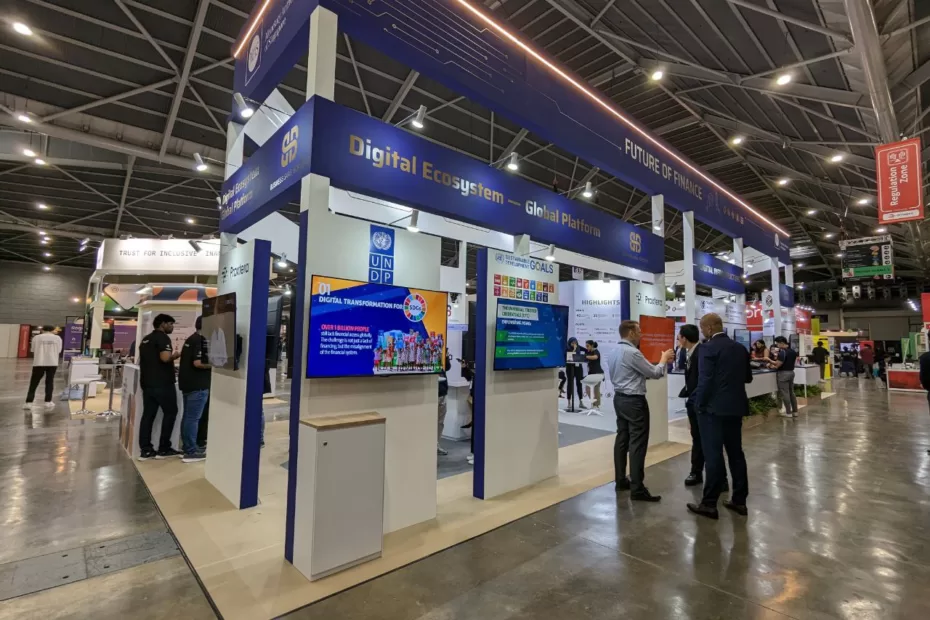A collaborative effort on the Sidelines of Singapore FinTech Festival on Tuesday, November 14 involving the United Nations Development Programme (UNDP), the Monetary Authority of Singapore (MAS), the Bank of Ghana (BoG), the Global Legal Entity Identifier Foundation (GLEIF), and the SME Finance Forum has resulted in the launch of Universal Trusted Credentials (UTC).
This global initiative has been introduced to ease access to financing for micro, small, and medium-sized enterprises (MSMEs) worldwide.
“The Universal Trusted Credentials initiative has the potential to revolutionize how we tackle the global MSME financing gap. This is in a way that empowers SMEs to support business growth and their green transition, encourages financial institutions to reach to new clients, leaves no one behind, and supports a greener, more sustainable economy.
This is a key priority for UNDP, which already works with thousands of MSMEs across the world on digitalisation, access to financing and integration of sustainability practices, and recognises the role that automated, data-driven digital solutions could play in driving scale,” Marcos Neto, Assistant Secretary General and Director, Bureau of Policy and Programme Support stated.
Currently, MSMEs account for up to 90% of businesses and 70% of employment worldwide . Globally, they still face significant challenges in accessing affordable finance to grow their businesses .
These challenges are compounded when MSMEs pursue cross border opportunities. These opportunities usually require them to navigate different regulatory frameworks, financial systems, and lending norms.
According to Sopnendu Mohanty, Chief FinTech Officer, MAS, UTC represents a game changing opportunity to augment the traditional collateral or asset-backed financing that almost all MSMEs face, towards a holistic approach that includes self-owned non-financial and financial credentials that each MSME should possess.
Also Read: Singapore FinTech Festival 2023 Kicks Off With a Focus on AI, FinTech and Innovation
UTC Initiatives
The UTC initiative proposes a framework for the creation of trusted credentials. These credentials that characterize an MSME’s financing worthiness based on traditional and alternative data sets.
The UTC initiative offers a comprehensive framework for assessing an MSME’s creditworthiness, drawing from both traditional and alternative data sources. These sources encompass a wide array of information that paints a more detailed picture of an MSME’s financial standing.
Source Data, for instance, encompasses information that can be reliably verified from multiple sources. They include utility providers, trade platforms, national registries, and data related to trade flows, buyer-seller relationships, as well as the prompt payment of utility and telecom bills.
Complementing this, Derived Data integrates additional indicators into the evaluation. This can include MSME’s commitment to improving financial literacy as well as its track record of making timely repayments. Taken together, these factors provide a holistic assessment of the MSME’s capacity to repay small loans. Thereby boosting confidence among financial institutions.
The UTC Initiative’s primary focus lies in enhancing the capabilities of MSMEs and streamlining access to data and financing through strategic collaborations in key emerging markets. This multifaceted approach includes various components that contribute to its overall effectiveness.
Trusted Data Providers, including UNDP, MAS, and their partners, will expand their existing capacity-building initiatives to foster a network of dependable data source providers. These providers will contribute to the creation of alternative data sets for UTC. To identify reliable data sources and evaluate potential international UTC issuers, a steering committee comprising central banks, financial institutions, and multilateral organizations will be formed.
Pilot Testing represents another crucial aspect of the initiative. UNDP, MAS, and their partners will enhance the UTC platform, initially piloted in Ghana, to accommodate a broader range of alternative data. Collaborative efforts with central banks and financial institutions in other emerging markets will be undertaken to refine and test the application of UTCs across international borders.
In addition, Standards Development will play a pivotal role in ensuring the initiative’s success. UNDP, MAS, and their partners will collaborate with a diverse group of international stakeholders.
They will span both the private and public sectors. Their goal is to establish a universal UTC standard that ensures seamless international interoperability. More so one that adapts to the evolving needs of the industry.
Also Read: Asia – Africa Trade Relations and why Singapore is an Economic Benchmark
About Monetary Authority of Singapore
The Monetary Authority of Singapore (MAS) is Singapore’s central bank and integrated financial regulator.
As a central bank, MAS promotes sustained, non-inflationary economic growth through the conduct of monetary policy and close macroeconomic surveillance and analysis.
It manages Singapore’s exchange rate, official foreign reserves, and liquidity in the banking sector.
As an integrated financial supervisor, MAS fosters a sound financial services sector. It does this through its prudential oversight of all financial institutions in Singapore.
MAS also works with the financial industry to promote Singapore as a dynamic international financial center. It facilitates the development of infrastructure, adoption of technology, and upgrading of skills in the financial industry.
Also Read: Singapore FinTech Festival 2023 8th Edition Set to Kick Off
About United Nations Development Programme
UND is the United Nations lead agency on international development.
The agency works in 170 countries and territories to eradicate poverty and reduce inequality.
UNDP helps countries to develop policies, leadership skills, partnering abilities. Likewise it also helps them develop institutional capabilities, and to build resilience to achieve the Sustainable Development Goals.
UNDP partners with people at all levels of society to help build nations that can withstand crisis. At the same time, It helps to drive and sustain the kind of growth that improves the quality of life for everyone.

